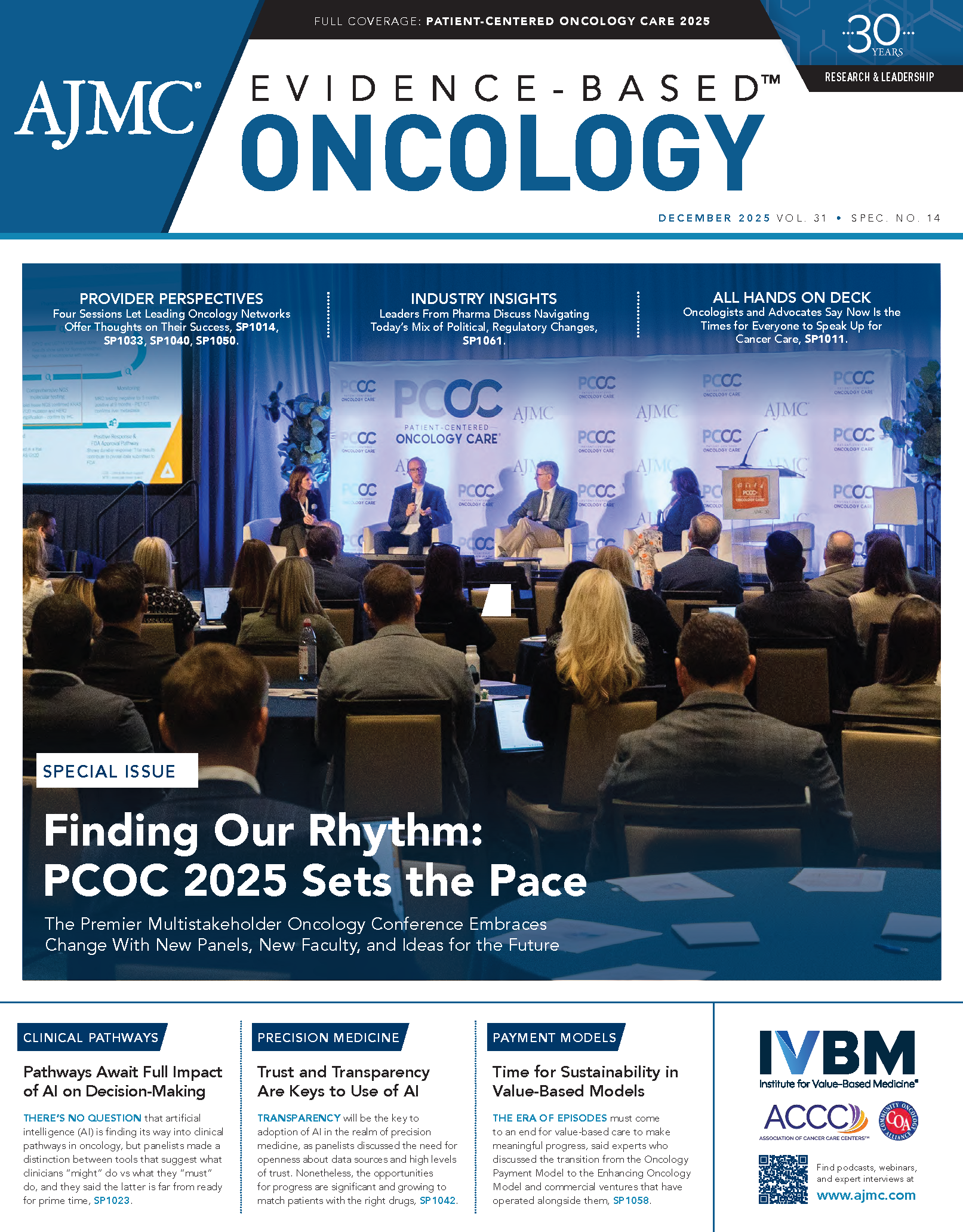- Center on Health Equity & Access
- Clinical
- Health Care Cost
- Health Care Delivery
- Insurance
- Policy
- Technology
- Value-Based Care
Peer Support, Online Resources Fill Gaps in Cancer Survivorship Care: Brian Koffman, MDCM, DCFP, FCFP, DABFP, MSEd
Many cancer survivors face ongoing physical and mental health challenges, which peer support and online resources can help address, says Brian Koffman, MDCM, DCFP, FCFP, DABFP, MSEd.
Peer-to-peer counseling from other patients, support groups, and online resources can help fill survivorship care gaps for patients when providers fail to offer that information, says Brian Koffman, MDCM, DCFP, FCFP, DABFP, MSEd, a retired family physician, chronic lymphocytic leukemia (CLL) survivor, and executive vice president and chief medical officer of the CLL Society.
Watch part 1 of this interview from the Patient-Centered Oncology Care® conference in Nashville, Tennessee, to learn about the persistent gaps in hematology survivorship care.
This transcript has been lightly edited; captions were auto-generated.
Transcript
What challenges do patients face when they finish active cancer treatment and are monitored less frequently?
I would make the question even broader. The broader question is, how do patients deal with these survivorship issues? A lot of the therapies to treat CLL and, bluntly, other cancers are very long-term. They're treated until progression, so patients can be on a therapy for many, many years, but they can be developing other complications: second cancers, cardiac complications, and bone issues, let alone all the mental health issues and stuff.
The survivorship issues are beginning even while the patients are still on ongoing therapy. They're not always related, particularly to the therapy or to the cancer itself, but to the whole issue of having cancer and what's going on. The resources have been limited, and that's one of the reasons that we set up the CLL Society; there's value in meeting a peer. When patients meet me and see me, and I'm a 2-decade survivor of an aggressive version of CLL, it's very affirming for them, saying, "He's done this for 20 years. Maybe I can do it for 20 years, too." That's more powerful than anything a hematologist or oncologist can say to them.
I talk about the preventive measures that I've taken, from vaccines to cancer screening to infection control. You see me wearing an N95 mask here because I'm at a conference. I'm traveling the world, and I'm doing all of this stuff, but I'm being careful in trying to avoid getting infections because I know my immune system isn't top-notch. That's true for a lot of cancer patients, especially CLL patients.
Having peer-to-peer counseling from other patients, support groups, and online resources—these are all kinds of things that can help patients fill the gaps where maybe the hematology, oncology, and primary care communities haven't always stepped up to provide the information.
Mental health, in particular, is often overlooked for cancer survivors. How can health care teams better support this need?
I think the issue of supporting mental health needs to first be recognized. I think most hematologist-oncologists get it, that patients walk in and they're not expecting it, especially with CLL, where the majority of patients, at least in first-world countries, are diagnosed when they go in for a routine checkup. They're going in to have a minor procedure or something, they get a CBC [complete blood count], and their lymphocyte count is elevated. Or, they've got a little lump in their neck, and they don't think anything, and then they're told that they have CLL or SLL, small lymphocytic lymphoma.
They're not expecting cancer, and then to be told you have cancer and it's incurable, and, "Oh, by the way, we're not going to do anything about it. You're going to go into active monitoring, active surveillance, or watch and wait." A patient has gone from being asymptomatic to suddenly stressed out.
Anxiety is the number one symptom for patients. I think most docs get that, recognize that, and try to address that when they talk to the patient. They need to set aside time and say, "Hey, I'm not going to give you everything right now. Let's follow up. I'm sure this has come as a shock to you."
But it's ongoing because there are all the issues of when you have to start treatment, and when do you stop treatment, and when you stop treatment, are you following for relapse? All of these things make it much more difficult. When you're in a trial, or when you're being monitored closely, then you're getting blood counts and stuff.
I had a patient whose child had CLL, and he, sorry, he had a different cancer, brain cancer. She used to tease me, she said she wished there was a scan that when he walked through the front door, she could scan the brain and make sure the tumor wasn't there so that every day she would know. I mean, it's very hard to let go when the therapy is stopped.
About how often should I be followed up? You're used to being followed very closely, and suddenly, "Well, we can go 3 months. Hey, you're doing well, we can go 6 months, we can go a year." Am I going to miss something? These are things that are very difficult for patients and need to be recognized.

